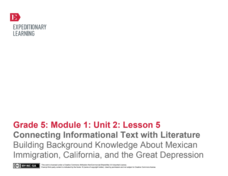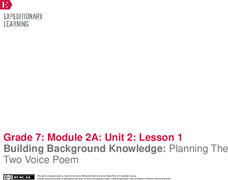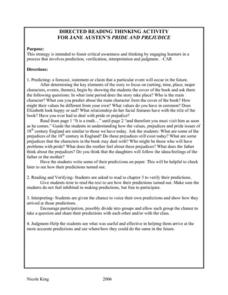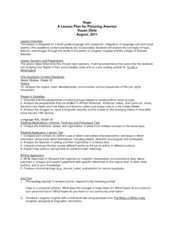K12 Reader
Using Prior Knowledge
Sometimes it's hard to relate to a new text. Teach kids to use their prior knowledge when reading something new with a comprehension exercise. A short passage tells them how to think of their brains like filing systems, and provides five...
Curated OER
Prior Knowledge: What Do You Know About Dogs?
Students consciously activate prior knowledge in order to comprehend new information about a given subject. In this comprehension and prior knowledge lesson, students use a graphic organizer to activate prior knowledge and use their...
Curated OER
Reading Comprehension Strategy: Using Background Knowledge
The value of this presentation is that it not only defines background knowledge but includes exercises that show readers how to activate and use what they already know about a topic to make text-to-self, text-to-text, and text-to-world...
Curated OER
Understanding a Story
Reading comprehension is the name of the game! After listening to the teacher model and share personal prior knowledge about small children and what they do with food, the class discusses how they too can use prior knowledge to...
EngageNY
Connecting Informational Text with Litearature: Building Background Knowledge About Mexican Immigration, California, and the Great Depression
Help your class transition as the setting in the novel Esperanza Rising, by Pam Muñoz Ryan, moves from Mexico to California. Beginning with prior knowledge, and moving into jigsaw research groups, class members add to and create posters...
Florida Center for Reading Research
Vocabulary: Word Meaning: Know or No
Activate the prior knowledge of young scholars as they expand their vocabulary with this language arts activity. Given a deck of cards containing new vocabulary words, learners sort them into four categories, from Don't know the meaning...
Media Smarts
Facing TV Violence: Consequences and Media Violence
Make your class aware of the difference between media violence and real violence. Using prior knowledge, a video clip, and a worksheet, class members explore and discuss the unrealistic portrayal of violence in the media. Learners...
Florida Center for Reading Research
Dictionary Cube
Young scholars investigate new vocabulary words with a fun, collaborative activity. Given a deck of word cards, pairs of students flip over one at a time and independently look up the term in a dictionary. They then take turns rolling a...
Scholastic
Lesson Two: The Earth, Introductory Activities
Determine what young pupils already know about earth science with a brainstorming activity. After class members work together to complete a KWL chart about the Earth, they craft an acrostic poem to demonstrate their understanding.
Florida Center for Reading Research
Comprehension: Monitoring for Understanding, What Do You Know?
An activity promotes reading comprehension. Readers analyze a text of their choice while activating prior knowledge and asking and answering questions. Scholars enforce multiple strategies to improve comprehension.
National Behaviour Support Service
Academic Vocabulary Building Activities
Suggestions for using Roberto Marzano's six-step approach to academic vocabulary instruction are detailed in a packet that includes graphic organizers, worksheets, and activities.
Curated OER
The Little Red Hen
Young readers access prior knowledge of how wheat becomes bread. Using "The Little Red Hen" story, learners make predictions of the events. Extension activities include singing a song about the story and making a list of ways to help...
Curated OER
Using Prior Knowledge from Personal Experiences-Understanding Duke Ellington
Students research the life of Duke Ellington. For this music history lesson, students draw comparisons between the early life experiences of Duke Ellington and themselves. Students work in small groups to compare Ellington's resistance...
Novelinks
Words By Heart: K-W-H-L Strategy
How can we heal our hearts through forgiveness? The third activity in a series of six prompts readers to answer questions about Words by Heart by Ouida Sebestyen. Not only does it activate background knowledge on the text, but it also...
EngageNY
Building Background Knowledge: Planning The Two Voice Poem
Scholars build background knowledge to understand the life and work of the union leader and labor organizer César Chávez. As they read teacher-selected resources, they complete a Building Background Knowledge worksheet and engage in...
Curated OER
Bud Not Buddy Pre-Reading Activity
Before you embark on reading Bud Not Buddy with your class, have them imagine they are in Bud's shoes. They must prioritize which of 13 items listed on a printable worksheet they would take with them to survive as a Depression-Era...
Baylor College
Needs of Living Things: Pre-Assessment
Determine your class's prior knowledge about the necessities of life with this pre-assessment for a unit on living things. Learners draw pictures of themselves with all the things they need to live, grow, and survive. These drawings will...
Bantam Books
The Martian Chronicles: K-W-H-L Activity
Prepare your class for a unit on Ray Bradbury's The Martian Chronicles with an activity that works for pre-reading, during reading, and post-reading. Learners fill out a K-W-H-L chart to reflect on what they already know, what they'd...
Curated OER
World Cup 2010: WebQuest and Activities
Young scholars discover the history of the World Cup and the current host country, South Africa. For this athletics lesson, students utilize the Internet to research and complete a WebQuest about South Africa. Young scholars discuss...
Curated OER
Pride and Prejudice: Directed Reading Thinking Activity
Can you judge a book by its cover? Decide who and what Jane Austen's Pride and Prejudice is about with a prediction activity. Before reading the first three chapters of the book, kids answer questions based on their interpretation of the...
Bantam Books
The Tempest: Fishbowl Discussion Strategy
Readers learn together with a group discussion activity. As they read William Shakespeare's The Tempest, high schoolers prepare for a fishbowl discussion in which three or four learners sit in the middle of a large circle and have a...
Curated OER
Picturing America: Images and Words of Hope from Romare Bearden and Langston Hughes
A carefully crafted three-day instructional activity integrates poetry and visual art. By analyzing and comparing Langston Hughes' poem "Mother and Son" and Romare Bearden's collage "The Dove," readers explore the theme of hope. The...
Arts Midwest
The Joy Luck Club: Culture and History
Explore San Francisco's Chinatown in a lesson about the first few chapters of The Joy Luck Club by Amy Tan. Kids research Chinatown on the Internet and create a virtual tour of the neighborhood, including the foods, cultural events, and...
Curated OER
Predicting Events in Realistic Fiction
How do you make a prediction? Practice active reading comprehension strategies, like making predictions, with your readers. Learners make predictions during the independent reading of Dogs Don't Tell Jokes by Louis Sacher. They observe...

























